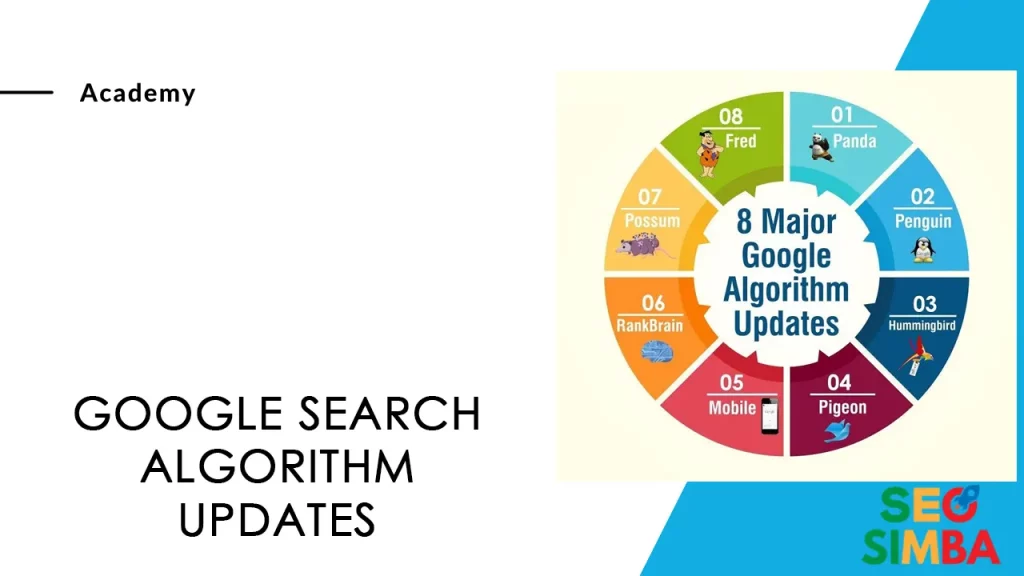The Google search algorithm is one of the most powerful forces on the internet, that determines how many clicks (and ultimately conversions i.e. clicks, e-mails signups). Learn the power of this force by reading about Simba’s Five Forces.
Google makes hundreds of changes to its Search algorithms i.e. how it ranks websites in its search results.
However, be careful to become a blue pill marketer, i.e. someone who obsesses over the algorithm updates more than anything else.

Florida — November 1, 2003
Websites that used black hat SEO tactics such using excessive keywords in their content, meta descriptions, meta keywords, heading titles etc lost their rankings in the search results
Jagger — October 1, 2005
Google released a series of updates, mostly targeted at websites with low-quality Backlinks, and obtained their Backlinks via reciprocal link exchanges and link farms.
Attribution Update — January 28, 2011
Google rolled out an update to help better sort out content attribution and penalize content scrapers.
Panda — February 23, 2011
This Google algorithm update penalized web pages with low-quality and thin content in the search results.
Freshness Update — November 3, 2011
Google announced that an algorithm change that rewarded content freshness for time-sensitive topics.
Venice — February 27, 2012
This update improved local search results. With the update Google Search would be able to serve local results reliably.
Penguin — April 24, 2012
This update was launched to better catch websites that spammed Google Search results by buying Backlinks or obtaining them through link networks.
DMCA Penalty (“Pirate”) — August 10, 2012
This Google update penalized websites guilty of repeated copyright violations.
Exact-Match Domain (EMD) Update — September 27, 2012
The EMD update was a filter that Google used to stop poor quality websites from ranking in the search results only because they had keywords that matched search queries in their domain names (web address URL).
“Payday Loan” Update — June 11, 2013
This update penalized websites that used search engine spam techniques (also known as spamdexing or Black Hat SEO) to improve their rankings for specific search queries that were considered “spammy”.
Hummingbird — August 20, 2013
Hummingbird was an update that helped Google Search better interpret the way text and queries were typed into Google. The algorithm placed greater emphasis on natural language queries, context and meaning over individual keywords.
Page Layout #3 — February 6, 2014
The page layout algorithm update penalized websites with too many ads above the fold i.e. too many ads or pop ups on the portion of a Web page that is visible in a browser window when the web page first loads.
Pigeon — July 24, 2014
Google updated its local search algorithm to include more signals from traditional search like knowledge graph, spelling correction, and synonyms. The update was aimed at increasing the ranking of local listing in search results. The changes affected the search results shown in Google Maps as well.
HTTPS/SSL Update — August 6, 2014
This update confirmed website security as an important ranking factor.
Pirate 2.0 — October 21, 2014
This algorithm update was rolled out to combat software and digital media piracy.
Mobile Update AKA “Mobilegeddon” — April 22, 2015
Google updated its algorithm to change the way results were ranked on mobile devices. It gave preference to websites who were mobile-friendly and demoted sites who are not mobile-friendly/responsive.
Intrusive Interstitial Penalty — January 10, 2017
This update punished websites that used aggressive interstitials i.e. an advertisement that appears while a chosen website or web page is still. Interstitials ads are highly disruptive to the user experience.
Mobile Speed Update — July 9, 2018
Google rolled out the mobile page speed update, making page speed a ranking factor for mobile results.
Google BERT Update — October, 2019
This update helps Google understand natural language text from the Internet. Its aim is to improve Google’s ability to understand natural language and conversational queries especially the nuances and context of words in them. The update will impact web pages with poorly written content.
